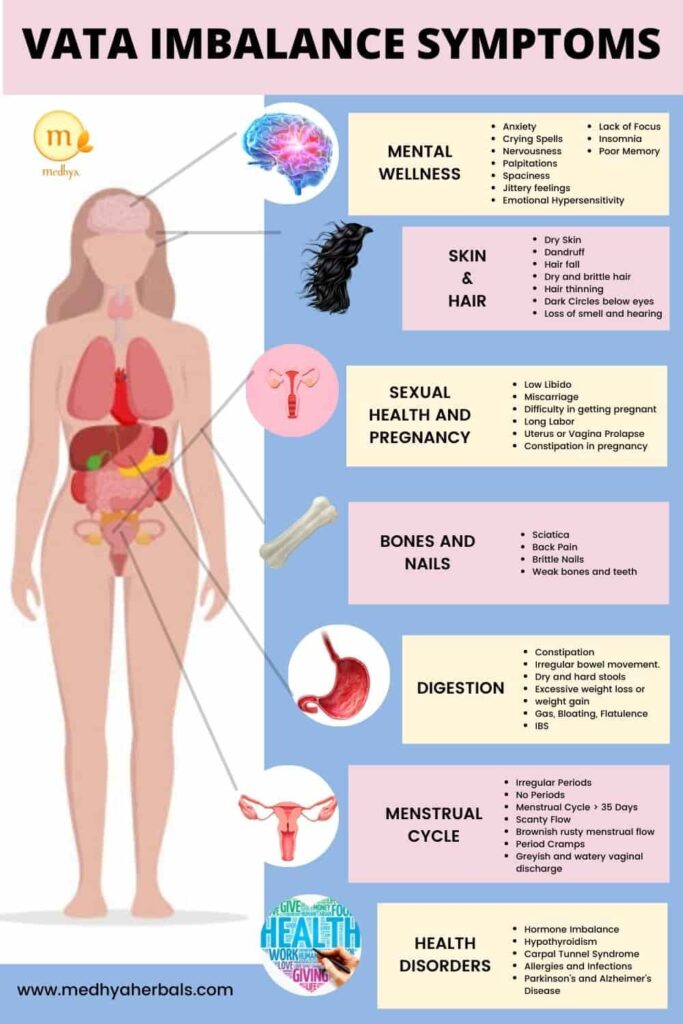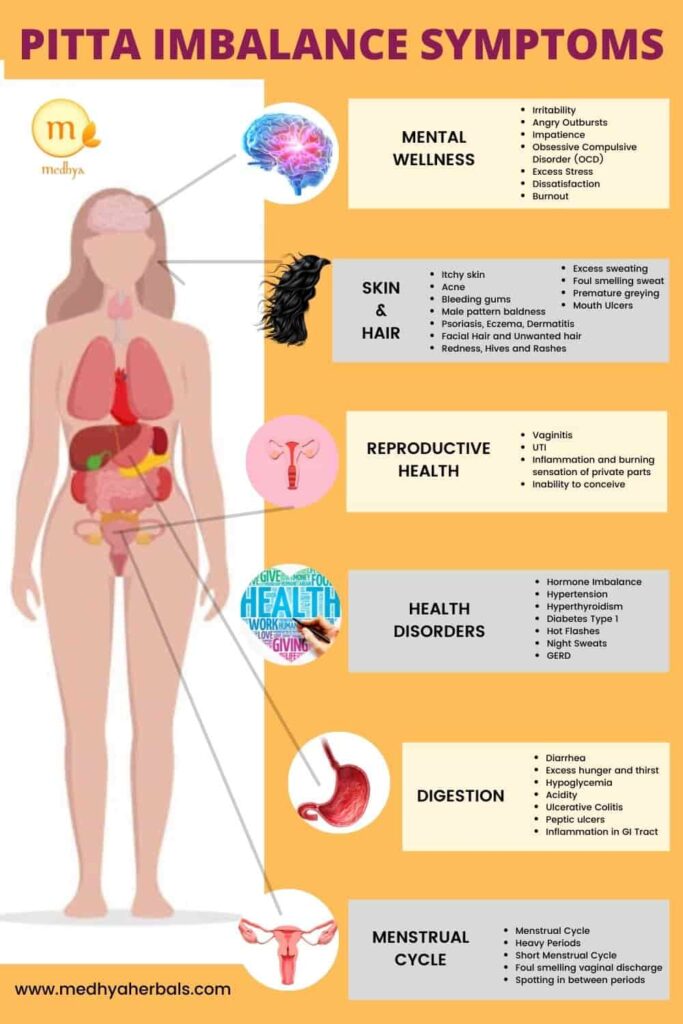In the realm of Ayurveda, the ancient holistic system of natural healing, the delicate balance of Vata Pitta dosha plays a profound role in shaping women’s health. If you’ve ever wondered how these two elemental energies, Vata and Pitta, can influence your well-being, you’re about to embark on a transformative journey. Vata, characterized by air and ether elements, governs movement and transformation, while Pitta, driven by fire and water elements, fuels our metabolic processes. The synergy between these doshas holds the key to unlocking the secrets of a balanced, vibrant life.
In this comprehensive guide, we embark on a journey to unveil the unique characteristics of Vata-Pitta individuals, explore the significance of these doshas in women’s health, and provide valuable insights into managing symptoms and imbalances that often affect women. Whether you’re seeking relief from anxiety, digestive issues, or simply looking to optimize your well-being, understanding Vata-Pitta dosha can be the transformative step you’ve been searching for. Get ready to dive deep into the world of Ayurveda and embark on a path towards a healthier, more harmonious you.
What is a Vata-Pitta Person Like?
Vata-Pitta dosha combines the elemental qualities of air and ether (Vata) with fire and water (Pitta). This amalgamation results in a dynamic equilibrium of movement, transformation, and vitality.
When in balance, Vata-Pitta individuals experience heightened creativity, adaptability, and intellectual prowess. However, an imbalance can manifest as physical and mental discomfort, emphasizing the need for equilibrium.
Physical Traits
- Lean and Agile: Vata-Pitta types typically have a slender build with a well-defined musculature. Their bodies exhibit agility and grace.
- Moderate Build: They often have a balanced bone structure, not too heavy nor too delicate.
- Sensitive Skin: Vata-Pitta skin tends to be sensitive, prone to conditions like rashes and irritation.
- Prominent Features: Facial features are usually well-defined, with sharp eyes and noses.
- Hair: Their hair may be fine, with a tendency toward premature graying or thinning.
Mental and Emotional Characteristics
- Intellectual: Vata-Pitta individuals are sharp thinkers, possessing a keen intellect and an ability to grasp complex concepts swiftly. They exhibit creativity in their ideas and solutions.
- Leadership Qualities: They are natural leaders with a strong sense of ambition and determination. At the same time, they possess a strong attention to detail, ensuring precision in their endeavors.
- Emotionally Expressive: While they can be passionate and assertive, they may also experience mood swings and emotional intensity.
- Adaptive: Vata-Pitta types can adapt to different situations with ease, making them versatile in various aspects of life.
Lifestyle Preferences
- Structured Routine: Vata-Pitta types thrive on a well-organized daily schedule that includes both work and relaxation.
- Competitive Nature: They enjoy challenges and often excel in competitive environments.
- Social: These individuals are sociable and value interpersonal connections.
Communication and Decision-Making
- Effective Communicators: They are articulate and persuasive communicators, able to convey their thoughts and ideas convincingly.
- Decisive: These individuals have the capacity to make quick and calculated decisions, often in high-pressure situations.
- Problem Solvers: Their problem-solving skills are highly developed, allowing them to navigate challenges effectively.
Medhya Herbals Dosha Type Test
At Medhya Herbals, we offer a comprehensive Vata Pitta Kapha Dosha Type Test designed to assist you in understanding your unique constitution. This test considers various aspects of your physical and mental attributes, lifestyle preferences, and reactions to different stimuli. By answering a series of questions, you’ll gain valuable insights into your dominant dosha, whether it’s Vata, Pitta, Kapha, or a combination of two or more.
We encourage you to take the Medhya Herbals Dosha Type Test to discover your Ayurvedic constitution and learn how to align your lifestyle and wellness practices with your dosha for optimal health and well-being. Understanding your dominant dosha is the first step toward a balanced and harmonious life according to Ayurveda’s ancient wisdom.

Common Symptoms of Vata-Pitta Imbalance
Vata-Pitta imbalance can manifest in a wide range of symptoms, affecting not only physical health but also mental, emotional, and women’s health. It’s essential to recognize these symptoms to address the imbalance effectively.
Physical Symptoms
- Digestive Disturbances: Vata-Pitta imbalance often leads to irregular digestion. Individuals may experience bloating, gas, indigestion, and alternating bouts of constipation and diarrhea.
- Skin Problems: Skin sensitivity increases, making individuals prone to skin issues such as rashes, hives, acne, or inflammation. Skin conditions may worsen during Vata Pitta imbalance.
- Fatigue: Experiencing fatigue or low energy levels is common. This can result from disrupted sleep patterns and fluctuations in energy due to the doshic imbalance.
- Menstrual Irregularities: In women, Vata-Pitta imbalance can lead to irregular menstrual cycles, heavy or painful periods, and mood swings before or during menstruation.
- Menopausal Symptoms: During menopause, women with Vata-Pitta imbalance may experience intensified symptoms such as hot flashes, mood swings, and sleep disturbances.
Mental Symptoms
- Anxiety and Stress: Vata-Pitta imbalances often heighten feelings of anxiety and stress. Individuals may find themselves constantly worrying or feeling overwhelmed by life’s demands.
- Irritability: Increased irritability and impatience are common mental symptoms. Individuals may have a short fuse and become easily agitated.
- Difficulty Focusing: Concentration and mental clarity may decline during imbalance, leading to scattered thoughts, forgetfulness, and a reduced ability to focus on tasks.
Emotional Symptoms
- Mood Swings: Vata-Pitta imbalance can contribute to mood swings and emotional volatility. Individuals may experience rapid shifts in mood, going from joyful to irritable quickly.
- Restlessness: Restlessness and an inability to relax are common emotional symptoms. It can be challenging to find peace and calm during this imbalance.
- Impulsivity: Impulsive behavior, such as making hasty decisions without careful consideration, may arise during Vata-Pitta imbalance.
- Emotional Sensitivity: Individuals may become emotionally sensitive, reacting strongly to external stimuli and interpersonal interactions.

Causes for Vata Pitta Imbalance
Vata-Pitta imbalance can result from a combination of factors, including lifestyle choices, dietary habits, environmental influences, and emotional stressors. Understanding the root causes of this doshic imbalance is crucial for prevention and effective management. Here are some common factors that can contribute to Vata-Pitta imbalance:
Dietary Factors:
- Inappropriate Diet: Consuming foods that aggravate both Vata and Pitta doshas can disrupt their balance. This includes spicy, greasy, or overly processed foods.
- Erratic Eating Habits: Irregular meal timings or excessive consumption of cold, raw foods can contribute to Vata-Pitta imbalance. Inconsistent eating patterns can disrupt digestion.
Lifestyle Choices:
- Stress: High-stress levels and a demanding lifestyle can exacerbate Vata-Pitta imbalances. Chronic stress can lead to mental and emotional turmoil, affecting both doshas.
- Excessive Mental Activity: Overthinking, excessive planning, or constant mental activity can disrupt Vata-Pitta equilibrium. This is often seen in individuals who are constantly mentally engaged or multitasking.
Environmental Factors:
- Seasonal Changes: Exposure to extreme weather conditions, especially during seasons that aggravate Vata or Pitta, can disrupt dosha balance. For example, excessively hot or dry climates can aggravate Pitta, while cold and windy conditions can affect Vata.
- Environmental Toxins: Exposure to environmental toxins and pollutants can also contribute to dosha imbalances. These toxins can affect the body’s natural detoxification processes.
Emotional Stressors:
- Emotional Turmoil: Emotional factors, such as unresolved conflicts, traumatic experiences, or prolonged emotional stress, can disturb the balance of Vata and Pitta doshas. These emotions can manifest physically and mentally.
- Lack of Emotional Expression: Suppressing emotions or failing to address emotional needs can lead to imbalances in Vata and Pitta energies.
It’s essential to identify and address these contributing factors to restore dosha balance effectively. Ayurvedic approaches, such as dietary modifications, stress management techniques, and lifestyle adjustments, can be employed to address these root causes and bring the doshas back into harmony. Consulting with an Ayurvedic practitioner can provide personalized guidance and treatment plans tailored to individual needs and imbalances.
Foods to Include and Avoid in a Vata Pitta Diet
Creating a Vata-Pitta balancing diet involves selecting foods that pacify both doshas, providing nourishment and stability.
Nourishing Foods
- Sweet Fruits: Ripe, sweet fruits like bananas, mangos, and melons provide essential vitamins and natural sugars.
- Cooked Vegetables: Steamed or lightly cooked vegetables like sweet potatoes, zucchini, and carrots offer grounding nutrients.
- Whole Grains: Opt for grains like basmati rice, quinoa, and oats, which provide sustained energy.
- Ghee: Clarified butter or ghee is a Vata-Pitta-friendly fat that supports digestion and enhances flavor.
- Avocado: Rich in healthy fats, avocados help maintain skin health and balance Pitta’s fiery nature.
Soothing Spices and Herbs
- Cumin: Cumin aids digestion and reduces excess heat, making it a suitable spice for Vata-Pitta individuals.
- Coriander: Coriander helps cool the body and enhances flavor without overwhelming the senses.
- Adaptogenic Herb: Ashwagandha is renowned for its adaptogenic properties, helping the body adapt to stress and reduce anxiety, common concerns for Vata-Pitta individuals. It also helps cool excessive Pitta tendencies, promoting a calm mind.
- Digestive Aid: Triphala supports healthy digestion, alleviating common digestive issues often experienced by Vata-Pitta types. It aids in detoxifying the body, maintaining overall health.
Regular and Mindful Eating
- Consistent Timing: Eating at regular intervals helps stabilize Vata and Pitta energies.
- Balanced Portions: Avoid overeating or consuming overly large portions to prevent digestive discomfort.
- Chew Thoroughly: Chewing food well supports digestion.
- Relaxed Environment: Eating in a calm, stress-free environment enhances the digestive process.
Hydration
- Room Temperature Water: Sip room temperature water throughout the day to prevent dehydration without aggravating Vata or Pitta.
- Herbal Teas: Enjoy herbal teas like chamomile or peppermint for added hydration.
Foods Vata Pitta Individuals Should Avoid
To maintain balance, it’s important for Vata-Pitta individuals to minimize or avoid foods that can aggravate their doshic tendencies.
- Spicy Foods: Extremely spicy dishes can overstimulate both Vata and Pitta doshas, leading to imbalances.
- Chilies: Hot peppers and excessive chili consumption should be avoided.
- Sour Dairy: Dairy products like yogurt and sour cream can increase Pitta’s heat. Opt for milder dairy options or dairy alternatives.
- Deep-Fried Foods: Foods high in unhealthy fats and heavy oils should be consumed sparingly as they can disrupt digestion and increase Pitta’s heat.
Recommended Daily Routines for Vata Pitta Dosha
Establishing a consistent daily routine is essential for Vata-Pitta individuals to maintain balance and promote overall well-being.
Consistent Sleep Schedule
- Regular Bedtime: Aim to go to bed and wake up at the same times each day to support a healthy sleep cycle.
- Adequate Rest: Ensure you get 7-8 hours of restful sleep to rejuvenate the body and mind.
- Pre-Dawn Awakening: Wake up during the pre-dawn hours (around 5-6 AM) to align with the Vata and Pitta qualities of this time, which promote mental clarity and calmness.
- Avoid Late Mornings: Avoid sleeping in too late, as this can disrupt your natural rhythm and lead to sluggishness.
Stress Management
- Daily Relaxation: Incorporate relaxation techniques such as meditation, deep breathing, or yoga into your daily routine to manage stress.
- Scheduled Breaks: Take short breaks during the day to recharge and prevent excessive mental activity.
- Mindful Planning: Plan your day thoughtfully to avoid overcommitting or rushing.
- Yoga and Meditation: Incorporate yoga and meditation practices to calm the mind and reduce stress.
- Breathing Exercises: Practice pranayama or deep breathing exercises to regulate both Vata and Pitta energies.
Emotion Regulation
- Mind-Body Practices: Engage in mind-body practices such as Tai Chi or Qigong to promote emotional balance.
- Avoid Overstimulation: Limit exposure to overly stimulating environments or situations that may exacerbate emotional fluctuations.
Moderate Exercise
- Regular, Gentle Exercise: Engage in regular, gentle exercises like yoga, swimming, or walking to prevent excess strain on the body.
- Avoid Overexertion: Be mindful not to overexert yourself, as intense workouts can increase Pitta’s heat and Vata’s restlessness.
The Best Places for Vata-Pitta Individuals to Live
Choosing the right living environment plays a significant role in maintaining dosha balance for Vata-Pitta individuals. While individual preferences vary, some general guidelines can help determine suitable locations:
Vata Pitta Dosha Friendly Climates
- Moderate Temperate Climates: Regions with moderate temperatures are often ideal for Vata-Pitta individuals. These climates strike a balance, avoiding extreme cold or heat that could aggravate either dosha.
- Coastal Areas: Coastal regions, with their humidity and cooling sea breezes, can be comfortable for Vata-Pitta types.
Natural Surroundings
- Green Spaces: Living near parks, forests, or green spaces provides Vata-Pitta individuals with opportunities for relaxation and connection with nature.
- Access to Water: Proximity to bodies of water like lakes or rivers can have a calming effect, which benefits both doshas.
Adjusting Your Surroundings for Dosha Balance
Even if you don’t live in an Ayurvedically ideal location, you can make adjustments to create a Vata-Pitta-friendly living environment:
Home Decor
- Color Choices: Use soothing, cool colors like blues and greens to create a calming atmosphere. Avoid overly bright or stimulating colors.
- Natural Elements: Incorporate natural materials like wood and stone to ground the space.
- Cooling Solutions: Use fans or air conditioning in warmer months to maintain a comfortable indoor temperature.
- Heating: Ensure adequate heating in cooler months to prevent Vata imbalances from cold environments.
Declutter and Organize
- Minimalism: Vata-Pitta individuals may benefit from a clutter-free environment to reduce stress. However, avoid excessive minimalism, which could exacerbate Vata’s restlessness.
- Orderly Spaces: Maintain an organized and structured living space to support mental clarity and Pitta balance.
- Soundscapes: Play calming music or nature sounds to reduce stress and create a peaceful atmosphere.
- Noise Control: Invest in noise-reducing curtains or rugs if you live in a noisy area.
Personal Space
- Soothing Personal Spaces: Create a sanctuary within your home for relaxation, meditation, or yoga. This space can be tailored to your dosha preferences.
- Privacy: Ensure you have privacy and personal space to retreat when needed.
- Natural Light: Allow natural light into your home during the day to balance both doshas. Use curtains or blinds to control light exposure.
- Soft Lighting: In the evenings, opt for soft, diffused lighting to promote relaxation.
- Greenery: Incorporate indoor plants to enhance air quality and connect with nature. Choose low-maintenance plants that align with your lifestyle.
Conclusion
In the pursuit of well-being, finding relief from the challenges associated with Vata-Pitta imbalances can sometimes feel like an elusive quest. We understand the complexities of this journey and empathize with the ups and downs it may entail. However, there’s hope, and it comes in the form of Ayurveda’s time-tested wisdom.
At Medhya Herbals, our team of experienced Ayurvedic doctors is here to provide you with personalized treatment plans tailored to your unique constitution and specific concerns. With Ayurvedic root cause treatment, we delve deep to address the underlying factors contributing to your condition. It’s not just about managing symptoms; it’s about finding lasting relief and reclaiming your vitality.
We invite you to take the next step towards a healthier, more balanced life. Schedule a consultation with our Ayurvedic doctors at Medhya Herbals, and let us guide you on your journey to permanent relief. Together, we’ll unlock the power of Ayurveda to help you achieve optimal well-being and vitality, naturally.
FAQ
Can someone be both Vata and Pitta?
Yes, it is entirely possible for an individual to exhibit qualities of both Vata and Pitta doshas, creating a Vata-Pitta constitution. In Ayurveda, this combination is recognized as a unique blend of characteristics, strengths, and potential imbalances. Understanding this dual dosha interplay is essential for tailoring lifestyle choices, dietary preferences, and wellness practices to achieve optimal balance and well-being.
Is Vata or Pitta insomnia?
Insomnia can be related to both Vata and Pitta doshas in Ayurveda, albeit with distinct underlying causes. Vata-related insomnia often results from a restless mind, anxiety, and overactive thoughts, making it challenging to fall asleep. Pitta-related insomnia, on the other hand, can stem from excess heat and intensity, leading to difficulty in unwinding and experiencing a restful night’s sleep. Balancing these doshas through lifestyle modifications, calming routines, and appropriate dietary choices can help alleviate insomnia and promote better sleep patterns tailored to an individual’s doshic constitution and imbalances.
Is anxiety a Vata or Pitta?
Anxiety can be associated with both Vata and Pitta doshas in Ayurveda, although the manifestation of anxiety may differ based on the dominant dosha and the specific imbalances within an individual. Vata-related anxiety tends to be characterized by restlessness, nervousness, and a racing mind, often triggered by unpredictability or change. On the other hand, Pitta-related anxiety can manifest as irritability, impatience, and anger, especially when faced with challenging situations or when perfectionist tendencies come into play. Balancing these doshas through Ayurvedic practices can help manage anxiety effectively and promote emotional well-being.
References
- Dosha brain-types: A neural model of individual differences
- Understanding personality from Ayurvedic perspective for psychological assessment: A case
- Pitta
- Ayurgenomics and Modern Medicine
- Relationships among classifications of ayurvedic medicine diagnostics for imbalances (vikruti) and western measures of psychological states: An exploratory study

